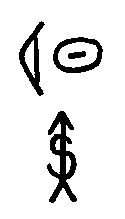 |
HEXAGRAM 36, MING YI |
Hexagram 35 and 36
Hexagram 36
 |
HEXAGRAM 36, MING YI |
It is
very difficult to find the right name of this hexagram. It might mean Brightness
Injured, Darkening of the Light (Wilhelm), or Bright Barbarian, or Ming Yi Bird
(Waley) or
Injury to the Eye (also Waley).
One translation might be very interesting: when the 'bowl' radical is added
below the sun-and-moon, ming becomes meng: alliance, covenant, oath. (See
'The Mandate of Heaven' by Marshall for all possibilities).
In 55 line 4 there is possibly question of an alliance with the lord of
Yi. The Yi-tribe had already caused trouble along the Eastern borders of the
Shang. The Shang had subdued the revolts, but the YI could be a powerful ally
for the Zhou against the Shang. This line changes to hex.36, which gives further
reason for "Alliance with the Yi". Probably not as THE translation, but as
another valid one. There is no reason, that one single translation should be the
true one, excluding all others.
Meng (name of hex. 55) is also one of the two ways to write Mengjin, the Fords of Meng.
Sometimes translated as 'Fords of Sworn Alliance'.
Then there is Yi the archer, a different character, but this Yi is
sometimes called Yi Yi: 'East Barbarian Yi', combining the two characters Yi. He
saved the earth from scorching by shooting 9 of the 10 suns, which fell to earth
as crows (a combination of several myths). Marshall made the combination with
the practice to shoot at the sun when there was an eclipse, in order to help it.
The black crow that inhabited it, was eating it, so people tried to scare it
away, or kill it. This means that Yi did not save the earth from scorching, but
saved the sun, by shooting the crow. Or maybe he did both.
Hex.55 line 4 can be about a meeting with the Yi-lord, and at the same
time a reference to Yi, saving the darkened sun. The archer Yi was very
arrogant, and the Yi-lord was a strong and unpredictable war-lord. But in a
fight the help of a strong ally is valuable.
It cannot be a coincidence, that the hexagram of the darkened sun has a
name, which relates it to Yi, the archer. And the ideogram depicts an archer
with a corded arrow.
(To my surprise I found in Marshall, that nobody ever had thought of a lord of a tribe. I had it in my text before having read the Mandate, but I did not have the knowledge to substantiate it, like Marshall does)
The lines of hex.36
Associations of lines
with historical figures (Wilhelm-Baynes p.565):
1: Bo Yi
2: King Wen
3: King Wu
4: Weizi (Wilhelm) or Bi Gan (suggestion of Marshall). Weizi is Zhou's elder
stepbrother, Viscount of Wei. Zhou did not listen to his warnings, so Weizi went
into voluntary exile. Bi Gan the 'Junior Master', expressed his concern about
the degeneration of the state, whereupon King Zhou had his heart torn out.
5: Jizi, the 'Senior Master', advised Weizi to flee, but stayed himself, and
feigned madness. Han Feizi says, Bi Gan knew the course of events, but not the mind of Zhou. The
ministers knew his mind, but not the course of events, but Jizi knew both.
6: Zhou Xin, the tyrant who was overthrown.
36.1 to 15 The Omen-bird at flight. Bo Yi and his brother went to Wen, because they hoped
to find there what they needed. They were ‘men of principle’, they searched for
a decent life, not for possessions, they were willing to travel, and even to
die, but when they arrived, their ideal was gone. And their criticism almost got
them killed (the words, both against them and in their favor). They starved
themselves to death for the sake of their principle.
In 36.1
it could be: do not let your principles make you too rigid to adapt to a new and
unexpected event. Hold on to them, but be like the reed, tough, but supple
enough not to be broken. The two brothers could have lived with Wu.
(Fanyao of 15.1: very compatible teamwords, adapt in your speaking)
36.2 to 11 Omen-bird. I think this line does not refer to Wen, but to King Mu. A bird alighted on the yoke, the horses panicked, the king got injured in the left thigh. See story "The Horses of King Mu"
36.3 to 24 Omen bird in the South. Hunting and catching the big head. Cannot make disease
determination. (No idea what this line might refer to.)
24.3 Brink return, danger, no fault.
36.4 to 55 Bi Gan, who lost his life by lecturing Zhou Xin. His heart was torn out, but he walked out of the door thanks to a spell. When he heard a man saying, no-one could live without a heart, the spell was broken. I don't know why it says "catching the heart of Ming Yi".
36.5 to 63 Jizi who feigned madness, and managed to survive, and to keep the lineage unbroken.
36.6 to 22 Zhou Xin, who was emperor, but disregarded the mandate, and fell down from his height. But also the sun, rising in the morning and shining all day, but inevitable having to go down at night. The day exists thanks to the night.